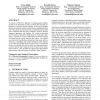Free Online Productivity Tools
i2Speak
i2Symbol
i2OCR
iTex2Img
iWeb2Print
iWeb2Shot
i2Type
iPdf2Split
iPdf2Merge
i2Bopomofo
i2Arabic
i2Style
i2Image
i2PDF
iLatex2Rtf
Sci2ools
144
click to vote
CIDR
2007
2007
A Black-Box Approach to Query Cardinality Estimation
We present a “black-box” approach to estimating query cardinality that has no knowledge of query execution plans and data distribution, yet provides accurate estimates. It does so by grouping queries into syntactic families and learning the cardinality distribution of that group directly from points in a high-dimensional input space constructed from the query’s attributes, operators, function arguments, aggregates, and constants. We envision an increasing need for such an approach in applications in which query cardinality is required for resource optimization and decision-making at locations that are remote from the data sources. Our primary case study is the Open SkyQuery federation of Astronomy archives, which uses a scheduling and caching mechanism at the mediator for execution of federated queries at remote sources. Experiments using real workloads show that the black-box approach produces accurate estimates and is frugal in its use of space and in computation resources. Al...
Related Content
| Added | 29 Oct 2010 |
| Updated | 29 Oct 2010 |
| Type | Conference |
| Year | 2007 |
| Where | CIDR |
| Authors | Tanu Malik, Randal C. Burns, Nitesh V. Chawla |
Comments (0)

